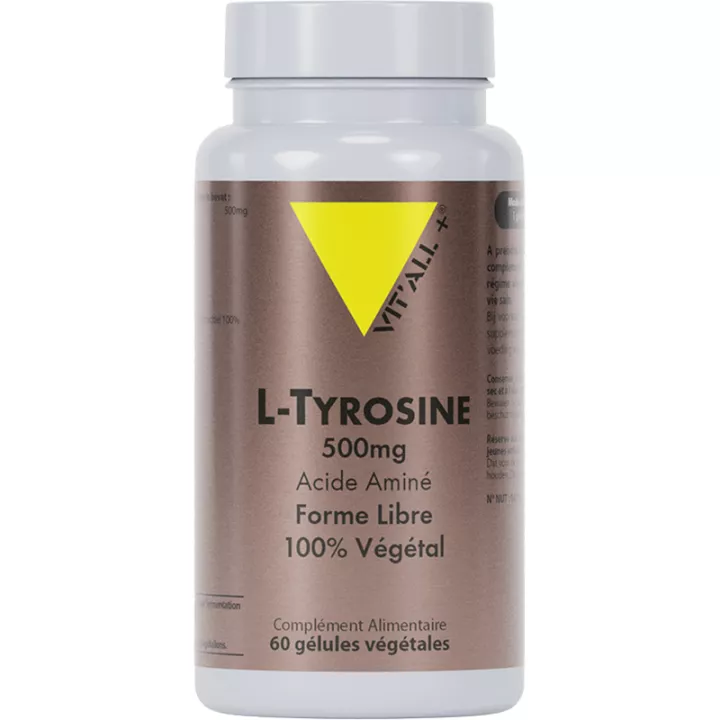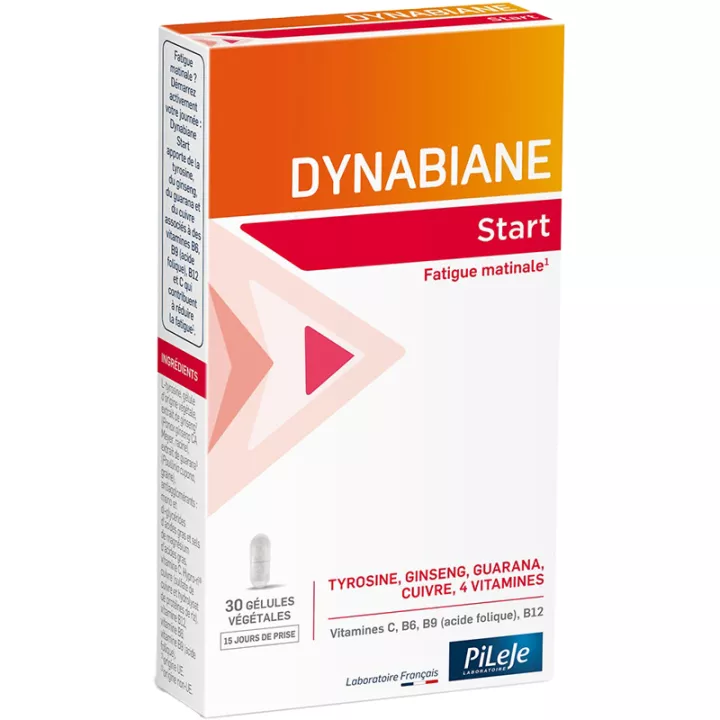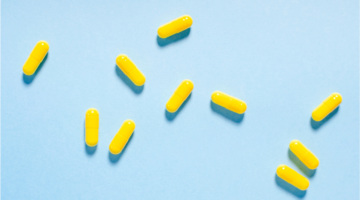What is L-Tyrosine 500mg Amino Acid Vitall+ used for?
Do you lack energy as soon as you wake up? Having trouble concentrating or getting your day off to a good start? L-Tyrosine 500mg Amino Acid Vitall+ is a dietary supplement designed to awaken the mind and stimulate the body. This amino acid, derived from plant fermentation, plays a key role in the production of dopamine, noradrenalin and adrenalin - the chemical messengers that regulate your mood, motivation and alertness. A natural boost to get you back into action.
L-Tyrosine is also a precursor of thyroid hormones, which means it plays an active role in the proper functioning of the metabolism. In times of fatigue, stress or low-calorie dieting, this molecule helps maintain stable energy levels while supporting basal metabolism. The result? A clearer mind and a more toned body, even when batteries are running low.
But that's not all. Thanks to its action on dopamine and L-Dopa, L-Tyrosine also helps to restore motivation and support concentration, especially during periods of cognitive overload. It promotes a state of alertness conducive to intellectual work or learning, while avoiding the effects of excitement or nervousness that can be caused by certain stimulant substances.
Its role in stress management is just as valuable. By acting on noradrenalin, L-Tyrosine helps modulate stress response, reduce mental fatigue and maintain optimal cognitive performance, even in the most demanding situations. It's an undeniable asset for those faced with a hectic pace or peaks of anxiety.
Last but not least, this dietary supplement has a natural thermogenic effect, i.e. it boosts the body's basal metabolic rate. In other words, it helps the body burn more calories at rest, making it an interesting ally in a slimming program, particularly when fatigue puts the brakes on efforts.
L-Tyrosine 500mg Vitall+ is a complete supplement, ideal for boosting concentration, reducing stress, supporting thyroid balance and accompanying slimming diets. Whether you're facing exams, professional overload, seasonal fatigue or need to rebalance your diet, this molecule will help you stay on course.
Ladrôme also offersExtrait de Plante Bio Gattilier, at the best price in our online pharmacy, to complement the benefits of this product.
How to use this L-Tyrosine product?
Directions for use
Take 1 capsule a day, preferably outside mealtimes to maximize absorption, ideally in the morning or before a meal rich in carbohydrates.
Other amino acids should be taken at intervals to avoid absorption interactions.
Give your opinion on the advice for use and dosage of L-Tyrosine 500mg Acide Aminé Vitall+ with our partner Avis Vérifiés after your purchase.
Precautions for use
- Store at room temperature (15°C-25°C), in a dry, dark place.
- For adults and adolescents only (subject to change, see product label)
- Keep out of reach of young children
- Do not exceed indicated daily dose
What are these thyroid-supporting capsules made of?
Ingredients
L-Tyrosine, Hypromellose (100% vegetable coating agent)
Nutritional values (per capsule)
| Ingredient |
Dosage |
| L-Tyrosine (free, natural form) |
500 mg |
Presentation
Box of 60 vegetarian capsules, available at the best price from our online pharmacy.
Expert advice
In naturopathy, L-Tyrosine is often used to support neuroendocrine functions during periods of chronic stress or fatigue linked to overwork. It is particularly useful for people with "hypo" conditions: hypothyroidism, hypodopaminergia (lack of motivation and drive), or for those who have difficulty getting out of bed in the morning, despite a good night's sleep.
It can also help with seasonal transitions, such as the transition to autumn or winter, when motivation and energy levels drop. Combining L-Tyrosine with a healthy lifestyle, a diet rich in complex carbohydrates and restful sleep optimizes its effects.
To reinforce its action, an intake of B vitamins (particularly B6) is often recommended, as they are involved in the transformation of tyrosine into dopamine. Synergy with adaptogenic plants such as Rhodiola or Ashwagandha can also improve overall resistance to stress.
Always favour a holistic, personalized approach, taking into account each individual's specific terrain. In the case of medical treatment or hormonal disorders, medical advice is essential before taking any supplements.















